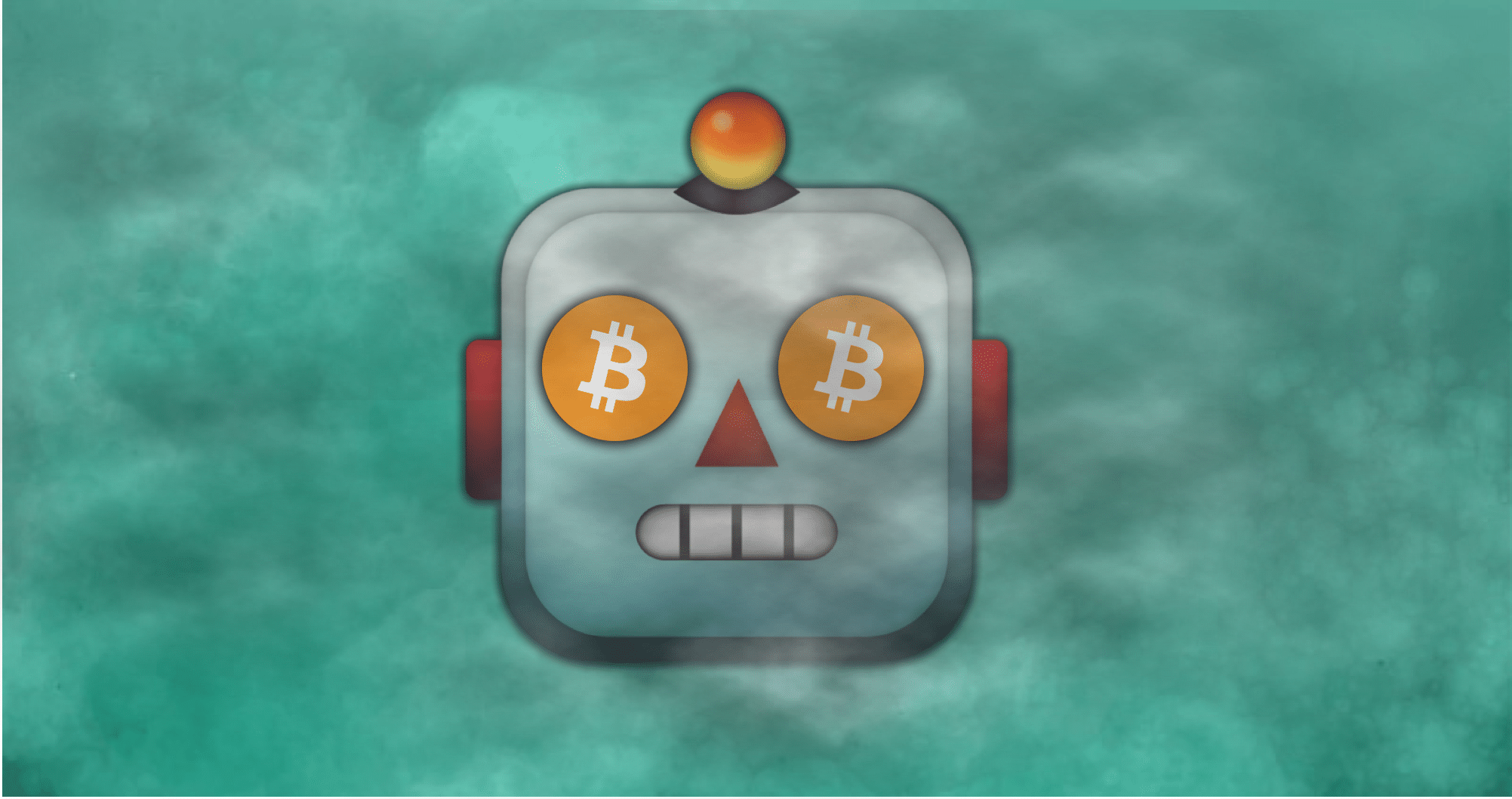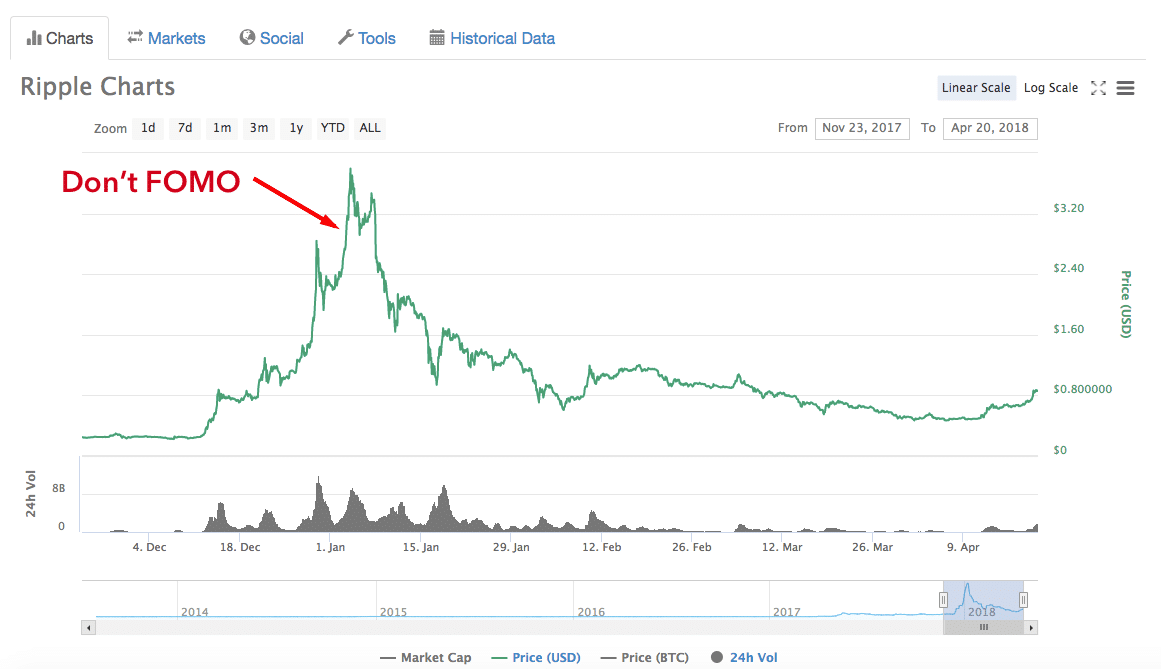- Mistake #1: Chasing Pumps aka FOMO
- Mistake #2: Not Knowing Your Investments
- Mistake #3: Selling at Inappropriate Times
- Mistake #4: Being Uninformed
- Good Luck Out There
Welcome to the Thunderdome (Cryptocurrency Trading)
Whether you’re a crypto expert or just getting your feet wet with investing, there’s plenty to be aware of when trading your way through the cryptocurrency industry. Unlike in traditional markets, cryptocurrency trading is chock full of volatility, nefarious players, and irrational price movements.
In this article, we’ll teach you about some of the common mistakes in cryptocurrency trading and how you can avoid them.
Mistake #1: Chasing Pumps aka FOMO
Probably the most common (and easiest) mistake to make in cryptocurrency trading is buying into a coin after it’s already risen a significant amount. Investors that bought into Ripple (XRP) and Tron (TRX) at the peak of their runs in 2017 definitely felt the pain just a few weeks later in 2018. It may be your instinct to throw some money in the ring when you see a coin shoot up 30-40% because it’s “hot.” Don’t.
Extreme increases in price are almost always accompanied by some type of pullback. By the time you hear about a “hot” coin, it’s usually too late. Unless you’ve done your research, believe in the fundamentals of the coin, and want to hold it for the long-term (>1 year), wait until the pullback to invest.
Pump and Dumps
Pump and dumps (PnDs) are a special breed of pumps that are guaranteed to leave you burned. If you see an unknown coin skyrocket all of a sudden, be wary. It’s most likely part of a PnD scheme. We go into more detail about PnDs in this article, but they’ve basically coordinated efforts to artificially drive up the price of a coin (the pump) before selling it to those who FOMO’d in (the dump).
When you come across a coin like this, the first thing to check is the trading volume. CoinMarketCap is a great resource for this. Any 24-hour trading volume under $1 million should raise a red flag.
Mistake #2: Not Knowing Your Investments
Don’t just blindly follow the advice of some Twitter or YouTube “guru” for investment picks. Many times, these high-profile individuals are paid to promote certain coins. Even John McAfee, one of the most well-known figures in the space admitted that he gets paid to promote projects. Question the coins that you’re told to invest in.
At the bare minimum, you should devote an hour to researching any project in which you plan to invest in. Check out what problem it’s attempting to solve, the team building it, and the economics of the coin. Has the project partnered with anyone significant? Any notable names as advisors? These are all things you should know.
Even a quick Google search could unveil some information that turns what may seem like gold into the trash. Taking it a step further, you should ideally read the whitepaper of each project you invest in.
Joining or forming an investment group can do wonders to help with this. It forces you to do research so you can explain your investment reasoning to your peers. It also puts you an environment in which you have to challenge your assumptions as others question your reasoning.
Mistake #3: Selling at Inappropriate Times
The opposite of chasing pumps, emotion-driven selling is still cut from the same cloth. It’s difficult, but you need to stay level-headed when trading – keep emotions out of it. Time and time again, coins have dipped down double-digit percentages before rocketing to 200-300% gains.
When a coin you own starts to drop in value, before you sell, re-evaluate your position. If you invested because you believe in the coin’s fundamentals, there are a few questions you can ask yourself:
- Have any of the fundamentals changed?
- Were there any announcements that would have affected the price?
- Have you stopped believing in the long-term vision of the coin?
If your answer to all of these questions is “No”, then consider holding on. This strategy becomes much easier when you follow the golden rule of cryptocurrency trading: Don’t invest more money than you’re comfortable losing.
On the other side of this equation, seeing some solid gains may also tempt you to sell. Although taking profits is wise, you may want to avoid selling your entire stack. Depending on the situation, the coin could rise further. A popular trading strategy is to take out your initial investment while keeping your earnings invested in the coin after gaining a certain percentage. This decreases your downside risk while still exposing you to the upside potential.
Mistake #4: Being Uninformed
In a market that moves as rapidly as cryptocurrency does, you need to stay up-to-date with industry news. Without tuning in weekly, or even daily, the investment tides could shift without you even knowing.
The good news is that there’s plenty of resources that make this easy. *Shameless plug alert* Here at CoinCentral, we provide the latest news and educational resources to help you out. Our weekly newsletter *cough sign up below cough* sends the week’s biggest news stories and articles directly to your inbox.
[thrive_leads id=’5219′]
Twitter, Reddit, and projects’ Telegram channels are also great resources you can use to stay informed. Oftentimes, teams share project updates and important announcements on these platforms before they hit mainstream media. Joining these communities also gives you the opportunity to be more involved with the projects while sometimes even impacting future development.
Good Luck Out There
Even with these tips, there are bound to be mistakes that you make. Don’t let that discourage you – it happens to everyone. Part of the investing process is to learn from those mistakes and not make them again.
Continuous improvement is the name of the game. And, as long as you’ve got that going for you, you’ll be a trading whiz in no time.
Never Miss Another Opportunity! Get hand selected news & info from our Crypto Experts so you can make educated, informed decisions that directly affect your crypto profits. Subscribe to CoinCentral free newsletter now.












